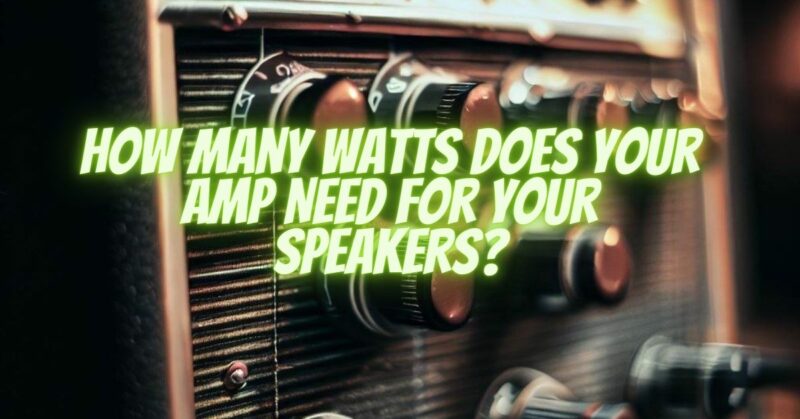Choosing the right amplifier wattage for your speakers is a crucial decision for audiophiles and music enthusiasts alike. An amp’s wattage plays a significant role in determining the sound quality, loudness, and overall performance of your audio system. In this article, we’ll guide you through the factors to consider when determining how many watts your amp should have to match your speakers.
- Matching Speaker and Amp Wattage
The relationship between speaker and amplifier wattage is essential for achieving optimal sound quality. In general, you want your amp’s wattage to be within the range recommended for your speakers. This ensures that your speakers can handle the power output of the amplifier without distortion or damage.
- Speaker Sensitivity
Speaker sensitivity is typically measured in decibels (dB) and represents how efficiently a speaker converts electrical power into sound. Higher sensitivity speakers require less amplifier power to produce the same volume as lower sensitivity speakers. For instance, speakers with a sensitivity rating of 90 dB will be louder with a 50-watt amp than speakers with an 85 dB sensitivity rating.
- Speaker Impedance
Speaker impedance, measured in ohms (Ω), is another critical factor when matching speakers with amplifiers. Most speakers have an impedance rating of 4, 6, or 8 ohms. Your amplifier should be able to handle the speaker’s impedance. Connecting a speaker with a lower impedance than your amp can handle may overload and damage the amplifier.
- Room Size and Listening Environment
Consider the size of the room where you’ll be using your speakers and amp. Larger rooms generally require more power to fill with sound effectively. If you have a small room, a lower wattage amp may suffice, but a larger room might demand a higher wattage amp to provide adequate volume and coverage.
- Musical Genre and Listening Preferences
Your preferred music genre and listening preferences also influence your choice of amplifier wattage. For instance, if you enjoy classical music or jazz, which tend to have a wide dynamic range and softer passages, you may not need as much wattage as someone who listens to heavy metal or electronic music with continuous high volume levels.
- Headroom and Clean Power
Having some headroom in your amplifier’s wattage can be beneficial. Headroom is the difference between the amp’s maximum rated power and the power needed for your desired listening level. Having extra headroom ensures that the amp operates comfortably without distortion, even during musical peaks.
- Bi-Amping and Multi-Speaker Setups
In some setups, you may have multiple speakers or employ bi-amping (using a separate amplifier for different frequency ranges, like a separate amp for bass and another for treble). In such cases, you’ll need to consider the power requirements of each speaker or amplifier in the system.
Conclusion
Choosing the right amplifier wattage for your speakers involves a careful balance between matching sensitivity, impedance, room size, musical preferences, and any unique system configurations. It’s essential to consult the manufacturer’s recommendations for both your speakers and amplifier and consider the factors mentioned in this article. Remember that it’s better to have an amp with slightly more power than you need (providing headroom) rather than risking underpowering your speakers, which can result in distortion or damage. Ultimately, a well-matched speaker and amplifier combination will deliver the best audio experience for your specific needs and preferences.


